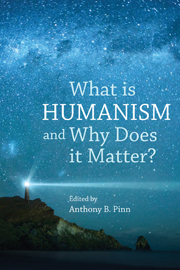Book contents
- Frontmatter
- Contents
- Preface
- Acknowledgments
- Part I What Is Humanism?
- Part II Why Doest Humanism Matter?
- 4 If War Is Not the Answer: An Altermodern Approach to Political Engagement
- 5 Humanist Outlaws: Thinking Religion/Living Humanism
- Part III What Do We Do With Humanism?
- Appendix: Humanist Manifestos
- Notes
- Select Bibliography
- Contributors
- Index
5 - Humanist Outlaws: Thinking Religion/Living Humanism
from Part II - Why Doest Humanism Matter?
- Frontmatter
- Contents
- Preface
- Acknowledgments
- Part I What Is Humanism?
- Part II Why Doest Humanism Matter?
- 4 If War Is Not the Answer: An Altermodern Approach to Political Engagement
- 5 Humanist Outlaws: Thinking Religion/Living Humanism
- Part III What Do We Do With Humanism?
- Appendix: Humanist Manifestos
- Notes
- Select Bibliography
- Contributors
- Index
Summary
There are kids committing suicide. They're already being told they're going to Hell. They're thinking, well, I might as well finish it …
—Alannah Caldwell, 21, The Attic Youth CenterYou know, a lot of people just think it's, you know, “Oh, they're just a bunch of rowdy, you know, ghetto, just heathen and thugs” No, what we are, are oppressed.
—Dragon, Rize (documentary, Lions Gate Entertainment 2005)Over the past several decades, hip hop culture and its various manifestations have marked out the development of an organic life orientation for young people across the globe. Scholars in the humanities have given deep thought to the religious, spiritual, and existential dimensions of hip hop. Although the recent burgeoning of religion in hip hop scholarship has given this area of study a more “legitimate” and “spiritual” face, analysis has often been confined to Christian theological notions. On the flip side, and with few exceptions, more pragmatic life philosophies, such as humanism, have done little to come to grips with changing contours of religion in culture, especially among communities of color. In other words, few scholars have given thought to humanism as a possible religious option and the types of sources that would benefit the growth and development of such worldview. What does humanism look like today among marginal youth and their cultural productions?
- Type
- Chapter
- Information
- What is Humanism, and Why Does it Matter? , pp. 77 - 92Publisher: Acumen PublishingPrint publication year: 2013



